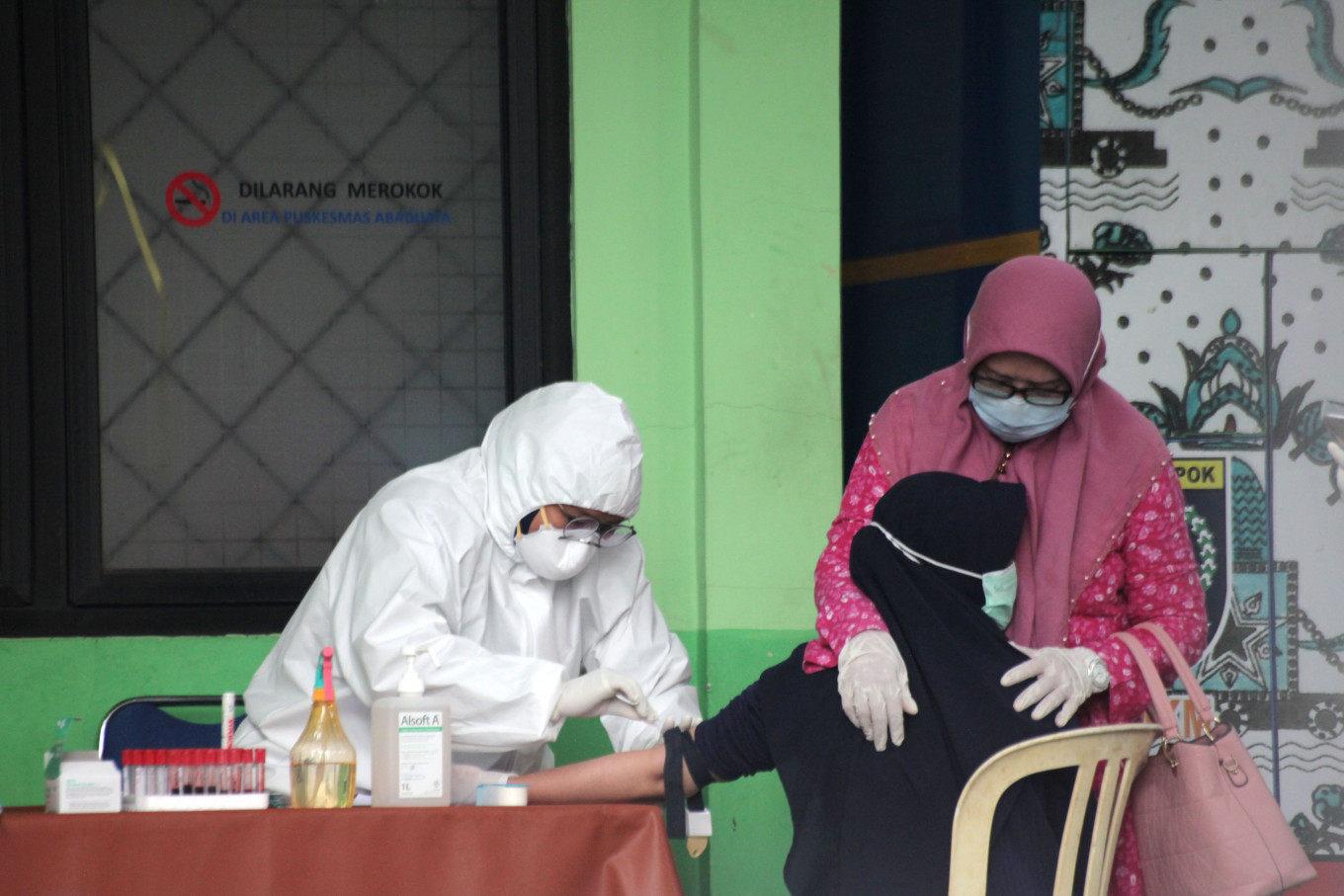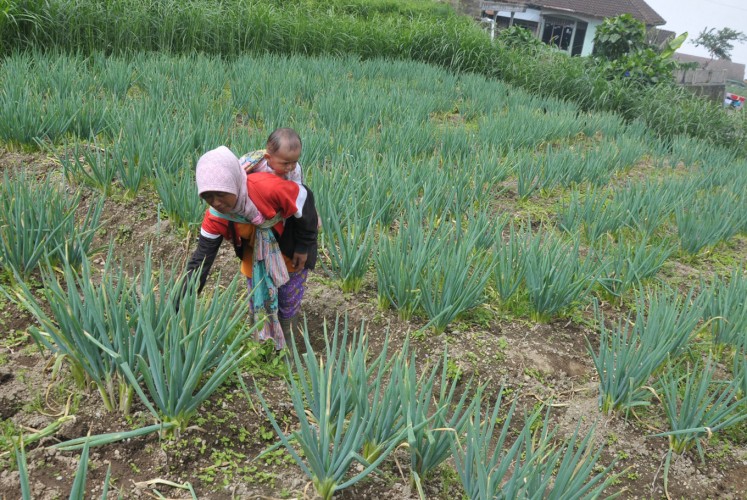Popular Reads
Top Results
Can't find what you're looking for?
View all search resultsPopular Reads
Top Results
Can't find what you're looking for?
View all search resultsCOVID-19 pandemic forces Indonesian mothers to do it all
The uncertainty brought about by the COVID-19 pandemic has taken a toll on mothers in Indonesia, where women are expected to bear the responsibility of child-rearing on top of other domestic chores.
Change text size
Gift Premium Articles
to Anyone
F
ive months pregnant, 33-year-old Niken Fajarsari has to juggle work, domestic chores and teaching her son, as schools have been closed in Jakarta to curb the transmission of COVID-19.
Despite Jakarta’s large-scale social distancing (PSBB) measures, Niken still has to commute to her job at a ministerial office in the heart of the capital city periodically, as her family is now relying solely on her income.
Her husband resigned from his job at a financial technology company in February to start a toy store and a coffee shop, both of which have been badly affected by the outbreak. The couple will sometimes accept catering orders for extra money.
"My son gets so much homework from his kindergarten, be it written tasks, arts and crafts or practical assignments. He must wait until I get home to finish the tasks [...] Moreover, it must be well-documented in pictures or videos, which are supposed to be submitted daily to the teachers. Doing this straight after work, while pregnant, makes me feel like I want to pass out," Niken told The Jakarta Post on Monday.
Schools have been closed in Jakarta, the national epicenter of the COVID-19 outbreak, since March 16, well before PSBB measures went into effect on April 10. Since then, many other regions have followed suit.
The Education and Culture Ministry issued a circular letter on March 24 calling for schools to provide distance learning activities for students while they stayed at home and announcing the cancellation of national exams.
It remains unclear when schools will reopen. The government predicts the outbreak could reach its peak in the country by the end of May.
The uncertainty has taken a toll on mothers in Indonesia, where women are expected to bear the responsibility of child-rearing on top of other domestic chores.
A 2016 Asian Development Bank (ADB) economics working paper found that childcare responsibilities limited Indonesian women's engagement in the compensated labor market. Women who had young children, the report said, were significantly less likely to work than their childless peers.
Although women did appear to reenter the labor force as their children got older, they did so through family work or self-employment as there was little re-entry into wage-based work as the children aged, the report found.
These have been among the reasons provided for women's low – but slowly growing – participation in the country’s workforce, despite sustained economic growth since the 1980s.
As of February 2019, the rate of women's participation in the workforce was 55.5 percent, a slight increase from 55.44 percent in February 2018. The figure was a stark contrast to men's labor force participation rate at 83.18 percent.
Role reversal: Painted by Bernardus Prasodjo when he was an art student at Bandung Institute of Technology (ITB) in the 1970s, the family portrait depicting a mother, her son, and her daughter indulging in tea-time with an assortment of Khong Guan cookies has been appropriated as a comical Internet meme by the predominantly millennial Indonesian users of popular social networking sites in recent years. (JP/-)Niken said that prior to the outbreak, she had to take care of house chores while looking after her son on her own, without the help of a domestic worker, who are often employed by middle- and high-income households in Indonesia.
Furthermore, there were growing expectations from Niken’s mother-in-law to follow in her footsteps as a working mom who had managed to handle everything by herself.
It was only after her husband resigned that they started sharing the domestic work, although it was no easy task in the beginning. Fights could not be helped as both tried to adjust to the new normal, she said.
"I'm afraid that my son won’t be able to study optimally. Sometimes, I can’t help but grumble in front of him because I’m tired from work. I sometimes feel guilty and sad because he is supposed to enjoy learning at home [...] It's important for mothers to stay sane," Niken said, just before Kartini Day.
Kartini Day, celebrated annually on April 21 to commemorate the birth of the eponymous national heroine Raden Ajeng Kartini, offers Indonesians the opportunity to appreciate and express their gratitude for the role of women, especially mothers.
Hailed as a symbol of women’s empowerment in Indonesia, Kartini’s life demonstrates the idea that women’s empowerment cannot be separated from education and contributions to public life, goals that are still often sacrificed for motherhood and marriage in general.
After leading a life enlightened by the promise of equal education opportunities for girls and women, Kartini was pushed into marriage and died giving birth.
During times of crisis, women are often burdened with greater expectations to carry out domestic responsibilities, including tending to children and ill members of the family, said Lily Puspasari, a program management specialist at United Nations Women in Indonesia.
With schools closed and disruptions at the workplace becoming the norm, including working from home, Lily said there was bound to be “more roles expected from women”.
"Our data shows that women do domestic work four times more than men," she told the Post on Monday.
A recent UN Women report, titled The First 100 Days of the COVID-19 Outbreak in Asia and the Pacific: A Gender Lens, also highlights this impact on women, noting that across the region, "the unequal distribution of unpaid care and domestic work between women and men is a major barrier to gender equality and women’s empowerment."
The report also highlights how women were growing increasingly vulnerable economically, as they are found to be over-represented in sectors and jobs hardest hit by the COVID-19 outbreak – in manufacturing, textiles and garments, care services, hospitality and tourism – and in employment with the least protections, including in the informal domestic sector and self-employment.
It also notes that women were at an increased risk of domestic violence during quarantine measures.
Breadwinner: A woman in the village of Jerakah in Selo district, Boyolali, Central Java, works on a farm while carrying her child. Most women in the district get married when they are 15 years old. (JP/Ganug Nugroho Adi)Sari Saraswati, 31, a marketing executive who now works from home, said she found it challenging to balance work and teaching her children, a 6-year-old kindergartner and a 2-year-old who is learning to speak.
She said that her conference call schedule was so intense that she could sometimes only spare an hour to help with school work or accompany her child in a Zoom meeting with teachers.
"I share work with my husband but my husband can only help in the afternoon because he sometimes sleeps from morning to noon," Sari told the Post.
Working from home might be fun for some but it might be "work from hell" for others, as 44-year-old lecturer and mother of one, Aprilia Kartini Streit, often says jokingly.
Aprilia, who teaches visual communication design at a private university in Jakarta, said there was much work to do at home and also virtually, as she had to be on standby for her students all day to assist them with their coursework. She also had to teach her daughter as she was being assigned lots of homework by the early childhood education center (PAUD) she attended.
Despite being an experienced teacher, Aprilia said she was not prepared to teach young children.
"My husband and I tried to share the work equally [...] But at certain times, when she had to eat, take a nap or drink milk, I had to be the one in charge. So I had to teach an online class while putting her to sleep or excuse myself from my students to take her to the bathroom. I have to do it all at once," Aprilia said.












